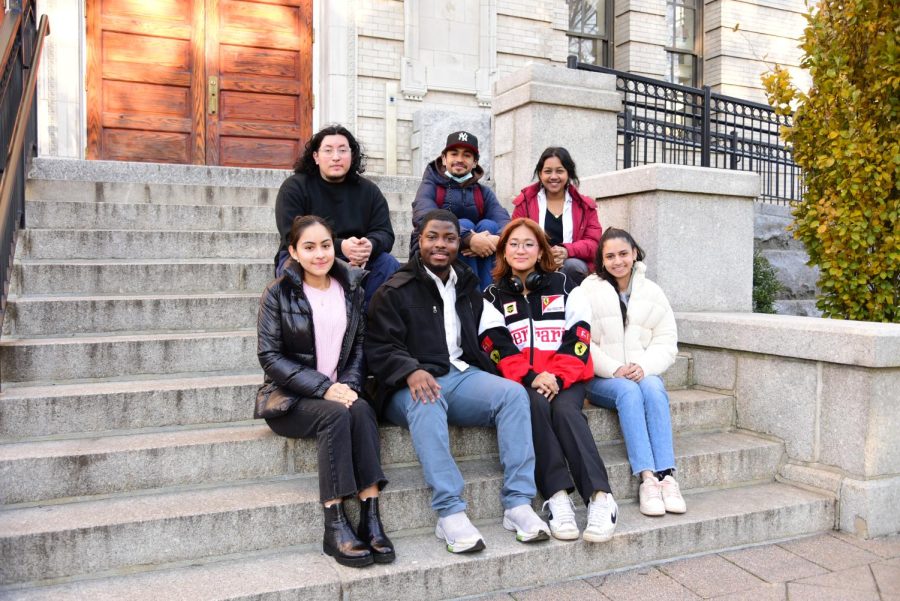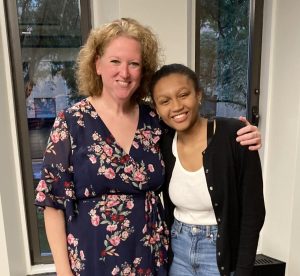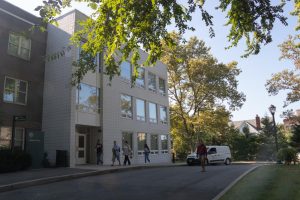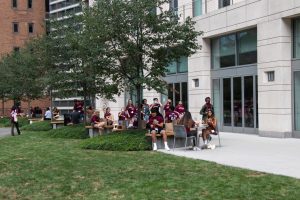Fordham Housing Fund Facilitates Academic Success of CSTEP Students
Initially formed through an alumni donation, the fund grants financial aid to STEM students from underrepresented backgrounds for on-campus housing
COURTESY OF CHRIS GOSIER VIA FORDHAM NEWS
Seven of the nine CSTEP students who received the Housing Fund which provides free on-campus housing to students who would otherwise need to commute.
March 5, 2023
Each year, over 40 Rose Hill students apply to Fordham’s Housing Fund program, which was created in 2011 to provide commuter students with free on-campus housing and meal plans so they can live on campus and participate in more activities and extracurriculars. This 2022-23 academic year, the Fordham Housing Fund is supporting nine students from Fordham’s Rose Hill campus through the Collegiate Science and Technology Entry Program (CSTEP), which has been a part of identifying the recipients since the fund’s inception.
CSTEP is a program that supports students from underrepresented backgrounds in the science, technology, engineering and mathematics fields. It provides assistance with academic and career development, graduate/professional school admissions, and more.
The fund was originally established by Brian and Kathy MacLean, both Fordham College at Rose Hill (FCRH) ’75, with an initial donation of $350,000 to accommodate housing for students who would benefit from living on campus. The MacLeans made additional gifts after meeting scholarship recipients and hearing from them.
Alba also noted that on-campus living fosters a dynamic living and learning experience, allowing students from different cultures and backgrounds to interact with one another.
According to Fordham News, the grant recipients often struggle with lengthy commutes and at-home living conditions that negatively impact their academic standing. In addition to providing a housing scholarship, the award also supplies recipients with a meal plan and a community of other CSTEP students to further accelerate their academic success.
“Students will have the ability to live on campus, not have to rush home for dinner time, and overall have a more enriching experience here at Fordham,” Renaldo Alba, associate director of CSTEP, said.
Alba also noted that on-campus living fosters a dynamic living and learning experience, allowing students from different cultures and backgrounds to interact with one another.
Recipients of these scholarships have expressed that the fund is both transformational and revitalizing in shaping the collegiate experience.
Alvin Feliz Varona, FCRH ’23 and a 2022 Housing Fund Scholarship recipient, explained how he used to commute two hours each way to classes. Since moving on campus, he’s been able to participate in more activities and is now the Black Student Alliance vice president and Minority Association of Pre-Health Students president.
“You have those extra four hours, your life changes completely,” Feliz Varona told Fordham News.
Yu Jin In, FCRH ’24 and another one of the scholarship’s recipients, explained that the housing scholarship has allowed her to allocate more time to completing her schoolwork and partaking in her hobbies, such as reading. Additionally, In noted that the fund allowed her to cultivate more friendships.
“I used to travel from Queens, which is about a 80-90 minute commute,” In said. “I had trouble making new friends because it felt like I was late to the game as a commuter student.”
“This gave me the chance to do something for myself but also continue with my academics. I could do what I want instead of what I need and then leave.” Daphne Buitron, FCRH ’23
Daphne Buitron, FCRH ’23 and scholarship recipient, was also able to participate in more activities, such as the dance club, by living on campus.
“This gave me the chance to do something for myself but also continue with my academics. I could do what I want instead of what I need and then leave,” Buitron told Fordham News.
Since it was first created, the size of the program has expanded from supporting two students to nine students per year. According to Alba, students are selected through a diverse analysis of GPAs, need and other qualifying factors.
“We’re always looking to increase the availability of seats for the program,” Alba said. “We look to recruit rising juniors to provide them a scholarship experience for two years. There’s a standard application and an interview conversation, in order to determine how students will make the most of their opportunity.”
“I believe there exists a necessity within the university and the broader educational community to provide students with accessible housing.” Elizabeth Esposito, FCLC ’26
eOutside of CSTEP, there are no similar initiatives or programs being offered to students in the form of free or discounted housing. With the Housing Fund’s continued success and growth, members of the Fordham community have initiated calls for similar programs to be built for commuters in general as well as for those in the creative arts, theater or business.
Lincoln Center students have also expressed interest in the creation of such a program at the Lincoln Center campus. Elizabeth Esposito, Fordham College at Lincoln Center ’26 and a visual arts major, believes Fordham can work on making affordable housing a priority.
“I believe there exists a necessity within the university and the broader educational community to provide students with accessible housing,” Esposito said.
For the students that do receive the scholarship award, however, the award has proven itself to be incredibly beneficial and revolutionary for their individual collegiate experience.
“This scholarship is continuing to help me advance towards my career goals as a science major pursuing research towards graduate school,” In said.













